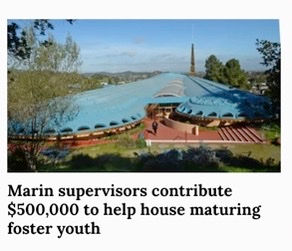Marin supervisors contribute $500,000 to help house maturing foster youth
- joanna
- Oct 19, 2023
- 3 min read
Marin Independent Journal, October 18, 2023, by Richard Halstead
Marin County supervisors set aside $500,000 this week to help a nonprofit that serves foster care children buy an apartment building in Novato. The Marin Foster Care Association is leading an effort to purchase the 10-unit complex for youths who are aging out of the county’s foster care system.
“Landlords simply won’t rent to our youth, or they make it very, very challenging,” said Ashley Hurd, the association’s executive director. “That’s how we ended up contracting to buy this building.”
The allocation, approved Tuesday, comes from the county’s affordable housing trust fund. In addition to county funds, the nonprofit has secured the promise of a $1.5 million loan from an anonymous private donor; a $500,000 grant from the Marin Community Foundation and $150,000 from the city of Novato. The association founded in 2003 to provide support services for foster care families is also providing $250,000 of its own money to complete the financing package.
LeeLee Thomas, deputy director of the Marin County Community Development Agency, described the apartment building as an “unregulated naturally affordable property.” That means the current owner of the property is charging tenants what in Marin is regarded as affordable rents. “The existing tenants will not be displaced,” Thomas said, “as is the case with all of our acquisitions of existing buildings of naturally occurring affordable housing.” Thomas said the units would be deed restricted to make them permanently affordable to low-income residents in the future. She said the units would be affordable to residents earning up to $90,000 a year.
“Obviously, those kind of rents would be difficult for transitional age youth,” Thomas said.
Thomas said the Marin County Department of Health and Human Services would be providing the foster youths with housing vouchers to subsidize the rents. There are currently two vacant apartments that would be immediately available for foster youths. The other units would be rented to foster youths as tenants leave of their own.
Bree Marchman, director of Marin County’s children and family services division, said that at any given time there are approximately 85 Marin youths in foster care. Parental neglect is the most common reason for a youth to be placed in foster care in Marin.“Primarily we hear from mandated reporters, anyone who’s working in a capacity where they’re interacting with children regularly,” Marchman said. That would include teachers, counselors, health care workers or police.
A majority of the Marin youths who end up in foster care are either Latino or Black; currently 37% are Latino and 31% are Black. Latinos account for 16% of Marin’s population while Black residents make up 3%. “We really don’t have the luxury of matching on race most of the time,” Marchman said of placing foster youth with parents of the same ethnicity. “We still absolutely need more foster families, especially for our teenagers,” Marchman said.
The county often has to place foster teens with families outside the area because families in Marin can’t be found to take them. The county strives to reunite youths with their parents or relatives and succeeds about 46% of the time, Marchman said. The majority of the county foster youth stay in the system until age 21, Marchman said.
“The state passed a law many years ago that allowed us to provide what we call extended foster care to young adults 18 to 25,” she said. There is government assistance, primarily housing vouchers, to help cover the cost of housing for foster youths until the age of 29. She said the problem is finding landlords who will rent to foster youth with vouchers.
“There’s a stigma attached to our youth,” Marchman said. “Landlords worry that they’re going to be problematic renters.” Marchman said it is important for landlords to know that in addition to vouchers the county Department of Health and Human Services provides foster youth living on their own for the first time with case workers to support them.
It is critical for foster youth to find housing that is near their schools, jobs and family members. Otherwise, she said they are at high risk of committing crimes, using drugs, suffering mental health issues and failing to achieve educational goals. “One of the most important things we can do to help move them away from those negative outcomes is to give them stable housing,” Marchman said.







Comments